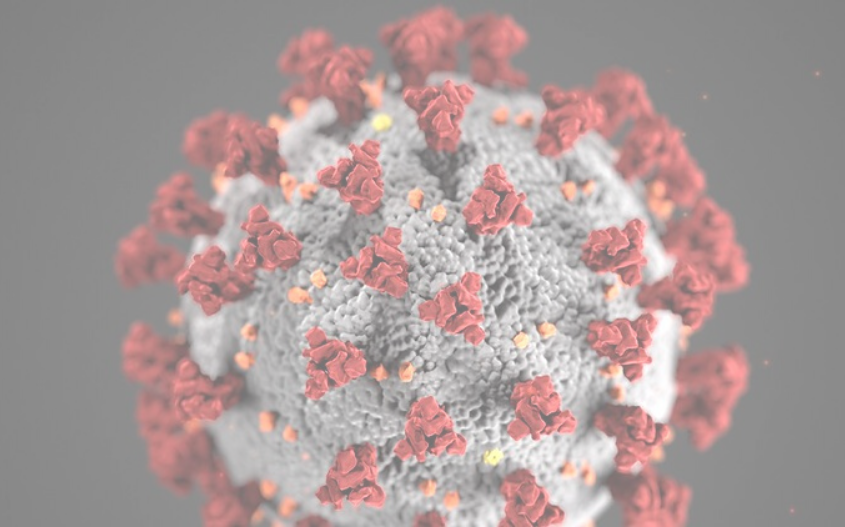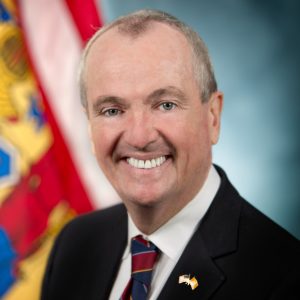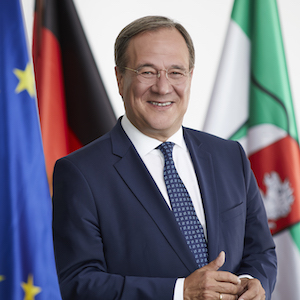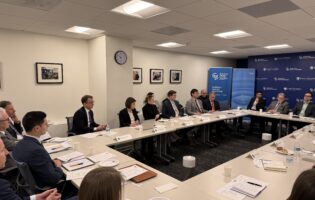
Leadership in Times of Crisis
How States Shape National Responses in Fighting COVID-19
A Digital Dialogue featuring
New Jersey Governor Phil Murphy and North-Rhine Westphalia Minister-President Armin Laschet
Federalism in the United States and Germany places extraordinary responsibility on state leaders, especially in responding to a crisis such as the coronavirus pandemic. How are Governors and Ministers-President driving our national responses? States often can react more quickly than the federal government; they also reflect national diversity and play a vital role in bringing regional concerns to the national level. What lessons do key states offer for managing the balance between public health, science, and the economy while the pandemic continues? How are they setting the stage for economic development and transformation post-COVID-19?
This interactive digital dialogue will feature leaders of two of the largest and most densely populated states in Germany and the United States, which have been at the front line of the global battle against the pandemic. We will explore the shared lessons for the United States, Germany, and the transatlantic and international communities.

Governor Phil Murphy, as he says, “grew up in a family that was middle class on a good day,” the youngest of four children with only one parent who graduated high school. His upbringing – where religion, a strong work ethic, education, and civic awareness were pillars of family life – shaped his values, his priorities, and the leader he is today.
Since taking office, Governor Murphy has focused on building a stronger and fairer New Jersey that works for every family. He has signed legislation putting New Jersey on the path to a $15-an-hour minimum wage, enacted the nation’s strongest equal pay law to combat gender wage discrimination, ensured all workers have access to paid sick days, and expanded the state’s Paid Family Leave provisions.
Governor Murphy has put a new emphasis on restoring the state’s dominance in the innovation economy by reinvesting in workforce development and supporting the growth of innovative and start-up companies.
Under his leadership, New Jersey is also emerging as a leader in combatting climate change through the deployment of offshore-wind energy technologies and banning offshore fossil-fuel exploration and drilling, among other measures to spur growth in the clean and renewable energy sectors.
Governor Murphy has reversed prior years of budget cuts and increased funding for both New Jersey’s top-ranked public schools and NJ TRANSIT. And, he restored state funding for Planned Parenthood and women’s health programs, including family planning services.
He has made New Jersey a national leader in tackling gun violence, and has expanded protections for the state’s immigrant and LGBTQ communities, among others.
Prior to taking office, Governor Murphy had long been deeply engaged in civic life and philanthropic pursuits. He has led and supported charities to lift up troubled teens and domestic abuse survivors. Nationally, he served proudly as New Jersey’s sole representative on the board of the NAACP, the world’s oldest civil rights organization, and as Finance Chair of the Democratic National Committee. The Governor has also led national and state task forces, respectively, on education and public employee pensions and benefits.
In 2009, he answered President Obama’s call to service and, following his confirmation by the United States Senate, became the U.S. Ambassador to the Federal Republic of Germany, where he served until 2013.
Governor Murphy and First Lady Tammy Murphy live in Monmouth County and are the parents of Josh, Emma, Charlie, and Sam.
A proud public-school product, Governor Murphy holds degrees from Harvard University and the Wharton School of Business at the University of Pennsylvania.

Minister-President Armin Laschet was born on 18 February 1961 in Aachen. He is married and father to three children. Mr. Laschet studied Law and Public Policy with a focus on International Law at the Ludwig Maximilian University of Munich and the University of Bonn. He sat his first state law exam in 1987. From 1987 to 1994 he was trained as a journalist, and worked as a freelance journalist for Bavarian radio stations and for the television programme Bayerisches Fernsehen. Furthermore, he was a science advisor for the President of the German Parliament, the Bundestag.
From 1994 to 1998 he was a member of the Bundestag, where he chiefly worked on the Foreign Affairs Committee and the Economic Cooperation and Development Committee. He was elected to European Parliament in 1999. There he focused his efforts on foreign policy and security policy, and was a parliamentary reporter for relations between the European Union and the United Nations. From 2005 to 2010 he was Minister of Generations, Family, Women and Integration for the State of North Rhine-Westphalia, making him Germany’s first Minister of Integration. As of 2010 he was also Minister of Federal Affairs, Europe and Media. Armin Laschet has been a member of the state parliament of North Rhine-Westphalia, the Landtag, since 2010, and Chairman of the CDU (Christian Democratic Union) State Association of North Rhine-Westphalia and Federal Deputy Chairman of the CDU of Germany since 2012. From 2013 to 2017 he was Chairman of the CDU faction in the Landtag of North Rhine-Westphalia.
Armin Laschet has been Minister President of the State of North Rhine-Westphalia since 27 June 2017.
Since 1 January 2019 he is also the Federal Republic of Germany’s Cultural Affairs Representative for the German-French cooperation agreement. He is a member of the Board of Directors for awarding the International Charlemagne Prize of Aachen, the Presidium of the United Nations Association of Germany, and the European Academy of Sciences and Arts in Salzburg.
Nick Schifrin is the foreign affairs and defense correspondent for PBS NewsHour, based in Washington, D.C. He leads NewsHour’s foreign reporting and has created week-long, in-depth series for NewsHour from Russia, Ukraine, Nigeria, Egypt, Kenya, Cuba, Mexico, and the Baltics. The PBS NewsHour series “Inside Putin’s Russia” won a 2018 Peabody Award and the National Press Club’s Edwin M. Hood Award for Diplomatic Correspondence.
Prior to PBS NewsHour, Schifrin was Al Jazeera America’s first foreign correspondent, based in Jerusalem. He led the channel’s coverage of the 2014 war in Gaza. He reported extensively on the Syrian war from Syria’s Turkish, Lebanese and Jordanian borders. And he arrived in Ukraine as violence peaked in Kiev and reported on the conflict in and annexation of Crimea. He won an Overseas Press Club award for his Gaza coverage and a National Headliners Award for his Ukraine coverage.
From 2008-2012, Schifrin served as the ABC News correspondent in Afghanistan and Pakistan. In 2011 he was one of the first journalists to arrive in Abbottabad, Pakistan after Osama bin Laden’s death and delivered one of the year’s biggest exclusives: the first video from inside bin Laden’s compound. His reporting helped ABC News win an Edward R. Murrow award for its bin Laden coverage. He ran the Islamabad and Kabul bureaus for nearly four years, beginning at age 28.
Schifrin is a visiting fellow at the University of Arkansas Clinton School of Public Service, where he lectures and teaches a foreign policy class. He is also a Council on Foreign Relations term member and an Overseas Press Club Foundation board member. He has a Master of International Public Policy degree from the Johns Hopkins School of Advanced International Studies (SAIS), with a concentration in Strategic Studies.
Support for this event was generously provided by The German Marshall Fund of the United States.







